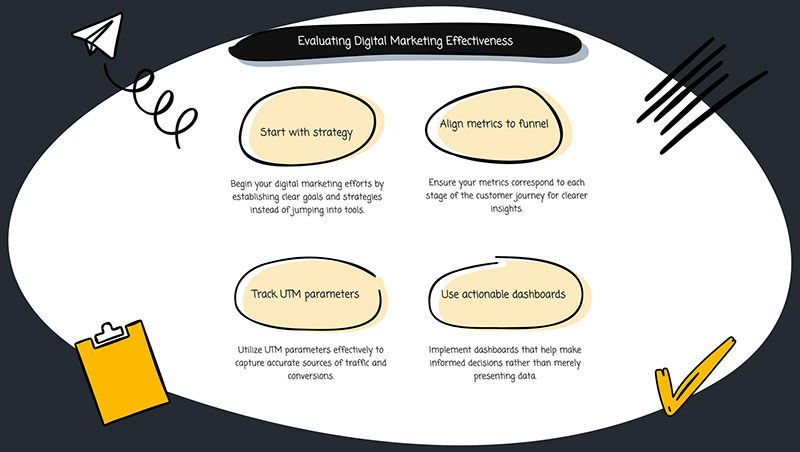As a digital marketing consultant, I’ve worked with CMOs, business owners, and marketing teams who’ve asked the same question in different ways: How do we know if what we’re doing is actually working?
We all want the same thing; clarity. We want confidence that the time, money, and creative energy we’re pouring into campaigns are moving the needle. And yet, when it comes to measuring digital marketing success, most brands fall into one of two traps: either they rely too heavily on vanity metrics, or they’re drowning in so much data they don’t know where to focus.
Let’s cut through the noise.
This guide is here to give you a practical framework for measuring digital marketing success effectively, one that connects your efforts to business outcomes and helps you make smarter decisions moving forward.
Why Measuring Digital Marketing Success Matters
If you’re not measuring the right things, you’re flying blind. I’ve seen brilliant strategies fail because teams couldn’t track or communicate their impact. And I’ve seen average campaigns thrive because they focused on what mattered and optimized ruthlessly.
Whether you’re running SEO, Google Ads, LinkedIn campaigns, email nurture flows, or retargeting sequences, measurement is what transforms your efforts from hopeful to powerful.
Measuring digital marketing success gives you:
- Clarity around what’s working and what’s not
- Confidence in where to invest your time and budget
- Control over your growth strategy
Let’s break down the steps that make measurement meaningful and actionable.

1. Start With Strategy, Not Tools
Before you jump into dashboards or tag managers, you need alignment. What are you trying to accomplish? “Get more leads” isn’t enough. You need specific goals tied to real business objectives.
Ask yourself:
- Are you trying to grow brand awareness?
- Drive marketing-qualified leads (MQLs)?
- Increase pipeline velocity?
- Improve lifetime customer value?
Once you know your goals, you can build a measurement plan that reflects them. That’s the foundation of measuring digital marketing success.
2. Define Success Metrics That Align With the Funnel
Too often, I see teams obsessing over impressions or click-through rates, but they can’t tell me how many qualified leads those impressions created or if they ever converted.
To measure digital marketing success effectively, your KPIs should align with each stage of the funnel:
- Top of Funnel (TOFU):
- Website traffic by channel
- Social engagement
- Branded search volume
- Middle of Funnel (MOFU):
- Form fills
- Lead magnet downloads
- MQLs generated
- Bottom of Funnel (BOFU):
- Sales calls booked
- SQLs created
- Close rates and revenue influenced
And here’s the key, tie every single one of those metrics back to a source. Know what channel or content asset drove the result.
3. Set Up Clean, Consistent Tracking From Day One
You can’t improve what you can’t measure. That’s why one of the first things I do when I onboard a new client is a full audit of their tracking infrastructure. Is Google Analytics 4 set up correctly? Are conversions being tracked on all form submissions? Are UTM parameters stored properly in cookies to capture first and last-touch attribution?
If not, you’re going to struggle to measure digital marketing success because you’ll be relying on flawed or incomplete data.
Here are a few must-haves:
- Proper GA4 setup with enhanced measurement
- Tag Manager configured for events and goals
- Cross-domain tracking if you’re using a subdomain or third-party tools like Marketo or HubSpot
- UTM parameter tracking for all campaigns
- Cookie capture scripts to store UTM values for attribution
I’ve seen the difference clean tracking makes, it’s night and day. You go from guessing to knowing.
4. Use Dashboards That Give You Insight, Not Just Numbers
I’m a huge fan of marketing dashboards, but only when they’re set up correctly. A dashboard should tell a story. It should answer the question, “What’s happening, and what should we do about it?”
A good dashboard helps you:
- Compare performance by channel
- Identify trends over time
- Spot conversion leaks
- Align marketing and sales on outcomes
When I build dashboards for clients, I focus on:
- Real-time campaign performance
- Monthly pacing toward goals
- Funnel conversion rates
- Attribution by source/medium/campaign
Avoid dashboards that show 50 different widgets and leave you overwhelmed. Simplicity drives clarity, and clarity drives action.
5. Connect Marketing Metrics to Business Results
At the end of the day, your leadership team doesn’t care how many sessions your blog got unless you can tie it to new opportunities or revenue.
That’s why a core part of measuring digital marketing success means connecting marketing activity to business results.
Ask:
- How many MQLs did this content or campaign generate?
- How many converted to SQLs or deals?
- What’s the average deal size by source?
- What’s our cost per opportunity from paid vs. organic?
When you can answer those questions confidently, you don’t just justify your marketing budget, you earn the right to grow it.
6. Analyze, Adjust, and Test
Measurement isn’t a set-it-and-forget-it discipline. It’s an ongoing process of iteration.
Review your performance weekly, monthly, and quarterly:
- What’s working? Do more of it.
- What’s not? Kill or pause it.
- What’s unclear? A/B test and refine.
I always advise my clients to treat every campaign like a living experiment. Test different offers, headlines, landing pages, and channels. Let the data drive your decisions, not opinions or assumptions.
That’s how you scale.
Bonus: Common Pitfalls to Avoid
Here are a few traps I see too often when it comes to measuring digital marketing success:
- Measuring too many things. Focus on the 5–7 metrics that really move the needle.
- Ignoring attribution. If you don’t know what drove a result, you’re guessing.
- Relying only on last-touch data. First interaction matters too, especially for SEO.
- Not aligning with sales. If marketing and sales aren’t on the same page, conversion data will always be noisy.
Avoid these, and your measurement strategy will be far more powerful.
Final Thoughts
Measuring digital marketing success is part art, part science, but mostly, it’s about discipline. If you’ve been pouring money into campaigns without clear answers about what’s working, it’s time to change that.
You deserve more than vanity metrics. You deserve clarity, confidence, and control. And you don’t have to figure it out alone.
If you’re ready to build a smarter, more strategic approach to digital marketing measurement, schedule a consultation today. I’ll help you audit your current setup, align your goals, and build a measurement plan that puts results front and center.
And if we’re not already connected, I’d love to stay in touch. Follow or message me on LinkedIn. I share insights weekly to help marketers, founders, and business leaders grow their brand with confidence.

